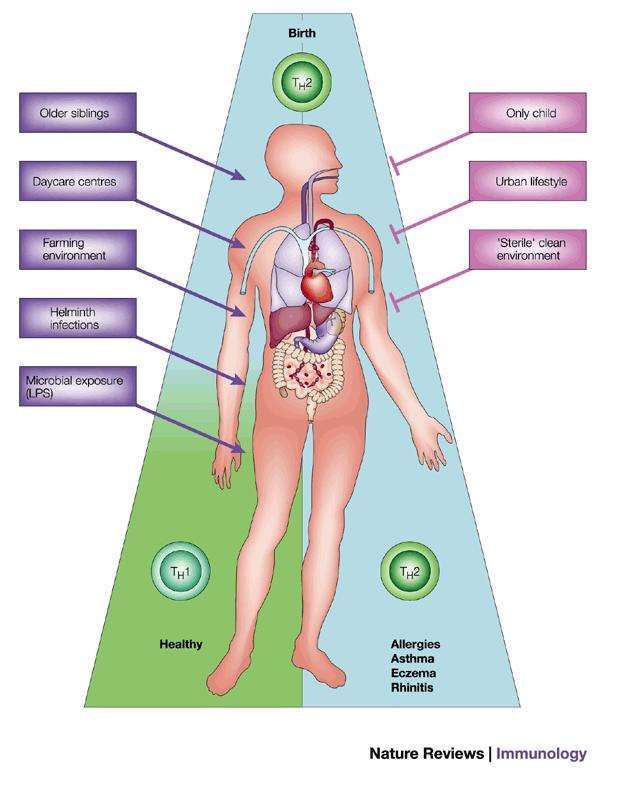This article first appeared at UCLA FOOD & DRUG ALLERGY CARE CENTER more than ago. Some information may no longer be current.
About Allergies / Why Are Allergies Increasing?
The occurrence of allergic disease is skyrocketing, and some estimates are that as many as one-in-five Americans have an allergic condition. Allergies are specific and reproducible undesired and unpleasant immune responses that are triggered by naturally occurring substances such as foods, pollens or other influences in our surroundings. Overwhelming evidence from various studies suggests that the "hygiene hypothesis" explains most of the allergy epidemic.
THE HYGIENE HYPOTHESIS
The hygiene hypothesis states that excessive cleanliness interrupts the normal development of the immune system, and this change leads to an increase in allergies. In short, our "developed" lifestyles have eliminated the natural variation in the types and quantity of germs our immune systems needs for it to develop into a less allergic, better regulated state of being.
This diagram simplifies the immune system into two separate tendencies: TH1 and TH2 responses. On the left, we see that exposures to germs, "dirt" and certain types of infection are part of the natural development of our immune response from a "default" TH2-based system at birth to a "mature" TH1-based system. On the right, we see how some cultural choices can interrupt the course of the immune system, and allow the TH2 response to continue to dominate and promote allergic conditions. Therefore, many of the advances of modernization, such as good sanitation and eradicating parasitic (helmith) infections, may actually be fueling this epidemic of allergies.

Nature Reviews Immunology 2002 (2) 132-138

Nature Reviews Immunology 2001 (1) 69-75
Why are food allergies increasing?
Food allergies are increasing as part of the overall trend of increasing allergies due to the hygiene hypothesis. However, there are some specific reasons that food allergies are increasing.
DELAYED INTRODUCTION OF FOODS
The recent practice of delaying the introduction of some foods such as peanut with high potential for allergy may be associated with higher rates of food allergy. Evidence for this theory comes from the fact that cultures that introduce peanut earlier have less food allergy while those that delay introduction of potentially allergic foods have seen a increase in food allergy. But this may be due to other factors. The LEAP study (www.leapstudy.co.uk) is a well-designed investigation that attempts to answer this question with respect to peanut allergy. Specifically, this large, on-going study seeks to determine which approach is associated with less peanut allergy: extended avoidance or the early introduction of peanut in high doses. Current guidelines from U.S.-based pediatric allergists recommend delaying solids until about 4-to-6 months. Beyond this age, there are no further recommendations to delay the introduction of "at-risk foods" for allergic reasons, but there are still restrictions about food for developmental and infectious reasons.
FORM OF FOOD WE EAT
Different forms of the same food appear to be more likely to provoke an allergic response, specifically roasting peanut rather than boiling them makes them much more likely to cause an allergic reaction. Also, many people with milk or egg allergy can tolerate baked forms of these foods.
INCREASED AWARENESS AND REPORTING
Heightened awareness among doctors, parents, teachers and the general public about the symptoms and potential consequences of food allergies may contribute the reason we are meeting more people with food allergy. Additionally, clinical research in food allergy is advancing rapidly, and earlier studies may have underestimated the rates of food allergy.
Drug allergies are also due to the immune system.
ADVERSE DRUG REACTIONS
Any unintended, undesired effect of a medication is called an adverse drug reaction. Allergic reactions are just one type of these reactions, caused by specific immune responses. It is important to know if an adverse reaction is actually an allergy due to an immune mechanism because these reactions can be unpredictable, and severe allergic reactions can be very dangerous. Also, allergic reactions generally respond to drug desensitization, but other adverse reactions do not.
ARE DRUG ALLERGIES AND ADVERSE DRUG REACTIONS INCREASING?
Only about 5-10 percent of adverse drug reactions are allergic reactions, and since we don't know the actual rate of drug allergy it is impossible to say if it is increasing. However, each new drug or supplement has possible unwanted and undesired side effects and the potential to cause allergic immune-mediated reactions. There is heighted awareness about the symptoms and potential consequences of drug allergies and adverse drug reactions by both doctors and patients. It is likely that both adverse drug reactions and drug allergies are increasing.
DOES THE HYGIENE HYPOTHESIS AFFECT DRUG ALLERGIES?
The hygiene hypothesis explains why there is an increase in allergies to foods, pollens and other components of our environment. People with allergic conditions such as food allergy, eczema, asthma and seasonal allergies or hay fever are not more likely to have drug allergies. However, people with underlying allergic conditions appear to be more likely to have severe and potentially dangerous allergic reactions to medications.
Accessed: July 25, 2013 at http://fooddrugallergy.ucla.edu/body.cfm?id=40
